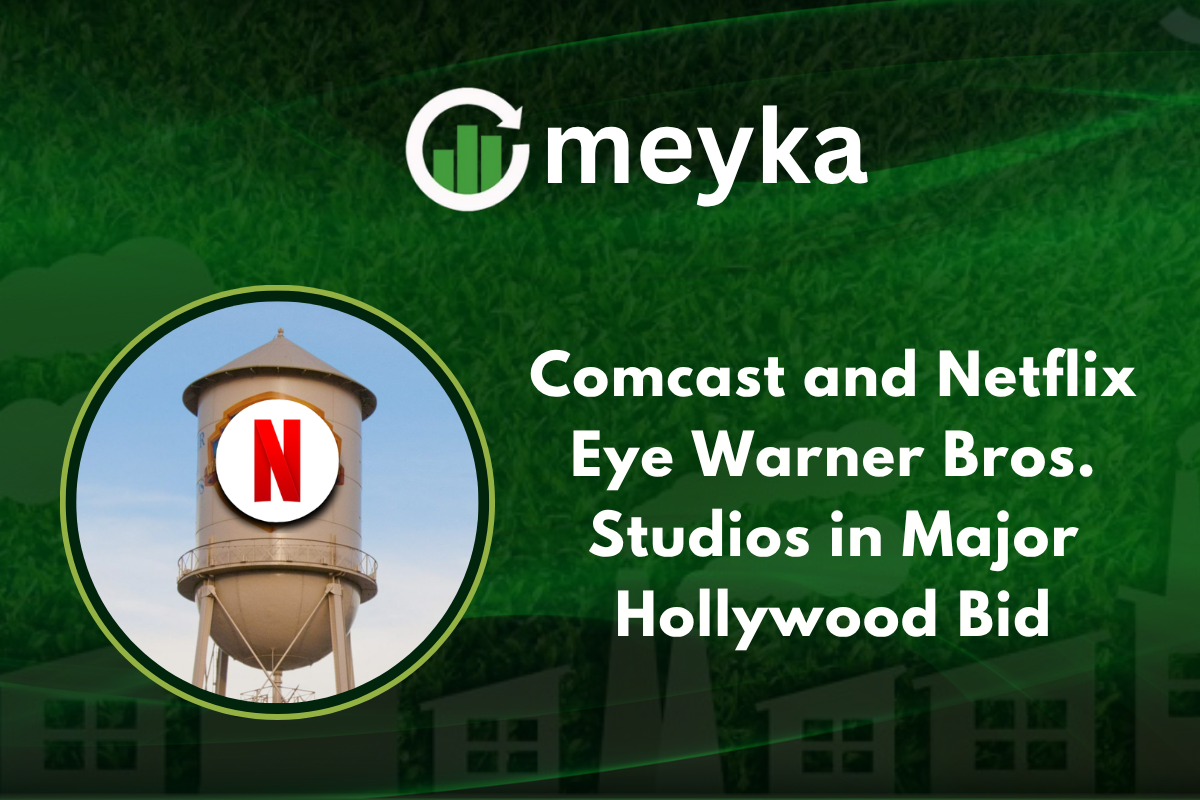Comcast and Netflix Eye Warner Bros. Studios in Major Hollywood Bid
Comcast and Netflix are reportedly exploring a major move: a bid for Warner Bros. Discovery’s film and TV assets. The story has rattled Hollywood and Wall Street. If true, the tie-up would reshape streaming competition, production power, and studio economics.
It also raises questions about antitrust scrutiny and the future of content ownership in an era of intense streaming rivalry. Sources report that Warner Bros. Discovery is reviewing options after recent interest surfaced, and industry insiders say both companies are positioning quietly.
Comcast and Netflix Join the Race for Warner Bros. Discovery
Reports from Bloomberg and The Hollywood Reporter indicate that Warner Bros. Discovery is considering offers or strategic options for parts of its studio business. Both Comcast and Netflix have been named among interested parties exploring possible bids.
The news has ignited a fresh wave of speculation about consolidation in Hollywood, and analysts are closely watching how rights, libraries, and production capacity might be split or combined. Industry chatter surfaced quickly on social feeds.
Why Is Warner Bros. Discovery Considering a Sale?
Warner Bros. Discovery has faced pressure from debt, changing cable economics, and the high cost of building a streaming business. The company’s leadership has been reviewing strategic moves to unlock value and reduce leverage, according to reports in The Guardian and Gizmodo.
Selling a flagship studio or carving out assets could help the company focus on core streaming operations and pay down debt. In short, rising costs, lower cable revenue, and heavy streaming investment have pushed management to weigh options.
Why now, and why Warner Bros.? Warner’s library and production capacity are among the industry’s most valuable assets, making them attractive to buyers seeking scale and content depth.
Comcast’s Strategy and Its Hollywood Ambitions
For Comcast, adding Warner Bros. assets fits a clear strategic script. Comcast already owns NBCUniversal, a major studio and streaming platform with Peacock.
A deal would expand Comcast’s content library, enhance production capacity, and strengthen its negotiating position with distributors and streaming rivals like Disney+ and Amazon Prime Video.
Comcast has a history in major media deals and sees scale as a defense in an expensive streaming market. Investors and analysts are parsing how a purchase would affect Comcast’s balance sheet and strategic posture.
Netflix’s Position in the Bid and Its Market Goals
Netflix has been on a long path to broaden its content base and production muscle. Owning parts of Warner Bros.’ library or studio operations would supply global streaming rights and deepen Netflix’s production pipeline.
The move would also help Netflix control more of its economics in a landscape where licensing costs can rise sharply. Industry specialists note that Netflix’s interest aligns with its push for more original content and production control.
This would be one of Netflix’s boldest strategic steps since it pivoted from DVD rental to streaming.
Could this be Netflix’s boldest move since its streaming debut? Yes, buying major studio assets would mark a major expansion of Netflix’s vertical footprint and content rights.
Industry Analysts Weigh In on the Comcast-Netflix-Warner Triangle
Analysts caution that any big deal will face regulatory scrutiny, especially under U.S. antitrust frameworks that watch market concentration. Media consolidation raises flags about competition, distribution access, and consumer choice.
At the same time, analysts argue that scale is often necessary for streaming profitability.
Social chatter and expert threads are already framing the debate: will this be a pro-competitive consolidation that saves studio economics, or a move that limits competition? Market watchers say stock moves could be volatile on any rumor or formal bid announcement.
Tweet on public reaction and policy concerns:
Financial and AI Stock Research Insights
Financial desks are using advanced analytics to model outcomes. AI Stock Research platforms crunch library values, projected subscriber impacts, and ad revenue scenarios to estimate deal returns. These models help firms judge how much of a premium is justified and what synergies may appear.
Analysts are looking at costs to integrate studios, potential content exclusivity gains, and licensing revenue that would shift under new ownership. These calculations feed into price targets and shareholder discussions across both Comcast and Netflix.
How AI Stock Analysis Shapes Media Investment Trends
Modern investment teams blend human judgment with machine learning. AI Stock Analysis tools parse viewership trends, licensing flows, and social sentiment to forecast which content will retain value.
For a deal involving Warner’s vast library, these tools can help estimate long-term streaming ROI, predict licensing demand, and map global rights monetization. This tech-driven approach does not replace due diligence, but it sharpens the picture for boards and investors deciding on high-stakes media deals.
Tweet on industry buzz and trading moves:
The Future of Hollywood if Comcast and Netflix Succeed
If Comcast or Netflix wins assets from Warner Bros., Hollywood would shift again. A combined slate of studios and streaming platforms could centralize power, reshape talent negotiations, and alter how films and series are financed.
Creative communities may face new gatekeepers; independent producers may find both risks and chances to partner on scale. The broader industry could see more consolidation, or it might prompt rivals like Disney and Amazon to respond with their own strategic moves. Either way, the deal would redraw competition lines.
Will this spark another wave of Hollywood mergers? Very possibly, as rivals may seek scale to match enhanced content libraries and production systems.
Conclusion
The possibility that Comcast and Netflix are circling Warner Bros. Studios marks a pivotal moment for media. Any deal would change streaming dynamics, studio economics, and the competitive map in Hollywood.
It raises the stakes for regulators, creators, and viewers alike. For Comcast specifically, a move would reinforce its role as a media giant, while Netflix’s interest would signal bold ambitions in content ownership.
The story is unfolding, and the industry will watch every development closely. Comcast’s next step could help define the era of streaming consolidation and studio power for years to come.
FAQ’S
No, Netflix is reportedly exploring a bid, but no deal has been finalized yet.
No, Comcast and Netflix are competitors; Comcast may bid independently for Warner Bros. assets.
Warner Bros. owns HBO, CNN, Cartoon Network, TNT, TBS, and Warner Bros. Television.
Yes, some NBA rights have shifted to competitors, reducing Warner Bros. Discovery’s sports broadcasting reach.
Disclaimer
The content shared by Meyka AI PTY LTD is solely for research and informational purposes. Meyka is not a financial advisory service, and the information provided should not be considered investment or trading advice.”






